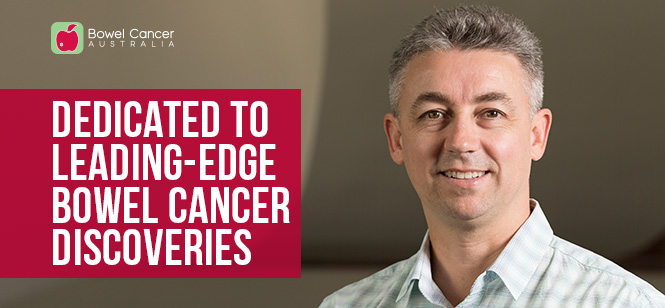A new grant secured by the Lawrence Penn Chair of Bowel Cancer Research laboratory from the Cancer Institute NSW will enable further investigation into the prognostic contribution of immune cell infiltration in rectal cancer.
The $600,000 grant will provide a three-year fellowship salary for Dr Pascal Steffen and help to cover some research costs for him to apply proteomic techniques to investigate the role of immune cells in rectal cancer.
Approximately 5,000 Australian men and women are diagnosed with rectal cancer each year. The aim of Dr Steffen’s CINSW fellowship is to understand the involvement of immune cell infiltration in rectal cancer, how this impacts tumour biology and how it affects patient outcomes.
To conduct the study over the next three years, Dr Steffen will apply his knowledge of protein mass spectrometry with access to the large archival rectal cancer tissue database at Royal North Shore Hospital. He will map the proteome (proteins found in the cancer) of these rectal cancers to understand their biology and how this links to patient prognosis, and work to resolve the complex immune cell architecture of these cancers by using a new technique of imaging mass cytometry.
The outcome of this research will lead to new prognostic biomarker panels, provide a better understanding of immune cells in rectal cancers and pave the way for new treatments.
“I am very excited to receive the CINSW fellowship as it will allow me to apply my expertise in proteomics to the cause of advancing the understanding of the role of immune cells in rectal cancer and furthering the research of new ways to combat this disease. This fellowship will also grant me the opportunity to broaden my knowledge especially in the field of immunology and imaging techniques,” said Dr Steffen.
Dr Pascal Steffen will conduct his fellowship in the Bowel Cancer and Biomarker Laboratory at The Kolling Institute, Royal North Shore Hospital in Sydney under the supervision of Professor Mark Molloy, Lawrence Penn Chair of Bowel Cancer Research, The University of Sydney.
“One of the key objectives for the Chair of Bowel Cancer Research is to increase research capacity and foster researcher development. I am delighted that the CINSW is supporting our vision through the award of this prestigious fellowship to Pascal. His research will reveal important new understandings in rectal cancer which is an essential step towards improving the outcomes for people with this disease,” Professor Molloy said.
Dr Pascal Steffen is a post-doctoral research associate (early career research fellow) and the newest member of the team working with the Lawrence Penn Chair of Bowel Cancer Research, Professor Mark Molloy.

The Lawrence Penn Chair of Bowel Cancer Research
Researching a cure for Australia's second deadliest cancer received a major boost recently with $10.4 million to establish the inaugural Lawrence Penn Chair of Bowel Cancer Research at the University of Sydney, launched in May 2018.
Contributing $6.4 million, Bowel Cancer Australia’s funding expanded Australia's research capacity and we anticipate the Chair will be a game changer for bowel cancer research in this country.
While screening can help with early detection, it won't eliminate bowel cancer. Research is the only way to discover a cure.
The Lawrence Penn Chair of Bowel Cancer Research is named after one of Australia's oldest bowel cancer survivors and is based at the University of Sydney's Northern Clinical School, Royal North Shore Hospital’s Campus.
An endowed professorial chair is recognised as a University's finest scholar in their field of expertise. They provide a research focal point in the country they are located, helping to attract and retain the brightest researchers and spur colleagues to their finest efforts - benefiting the entire Australian community.
Professor Mark Molloy is a biochemist and has developed his expertise in the science of 'proteomics'. He is internationally recognised as an expert in the application of mass spectrometry in biomedical research. Professor Molloy’s focus areas are in translational cancer research, biomarker studies and cell signalling.
The commencement of Professor Molloy as the Lawrence Penn Chair of Bowel Cancer Research is the culmination of many years of hard work






